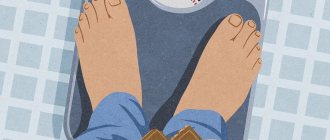What is a "breakdown"
I was on a diet, ate right, counted calories, didn’t allow myself anything sweet, not even buckwheat or pasta, if we were talking about low-carb or keto, and then - BAM! - darkness... And then you find yourself on a mountain of candy and chocolate wrappers, an empty bucket of ice cream on your head, a half-eaten piece of cake in your hand, your stomach is so full of sweets that it’s hard to breathe. Congratulations - you've nailed it! Happens.
This also happens with training. You go like hell 4-5 times a week to the gym and the stadium, and then you can’t force yourself to get there. Even kick and drag. Of course, in this case the breakdown does not occur as sharply as in nutrition, but the thing is no less dangerous.
I missed a workout once, I missed two, and then I didn’t even notice how a couple of months flew by without jogging or “rocking.” This has happened to me once in the 20 years that I have been training with weights. One time that turned into an eight month break.
That is, a breakdown is a sudden overeating on a diet and an unexpected break in training, which can be dangerously prolonged.
If you go on a visit, you can eat everything. It is impolite to refuse
Another common option for breaking a diet is getting into provocative conditions. Going to a restaurant or visiting. Here we must admit that this is not an apology or justification. We end up in such situations 99% of the time as planned, agree. And if so, then our task is simply to prepare for this event. For example, come to visit not hungry, so that you can look at all the treats with indifference and limit yourself to the minimum set on your plate, devoting most of your time to the main thing - communication. Of course, there is not much point in going to a restaurant with a full stomach, but you can also have a light snack. And it is extremely important to determine your menu in advance. Either look on the establishment’s website to see what dishes are offered, or simply establish that it will be, say, steamed fish and salad. The main thing here is not to find yourself in a situation where you need to make an urgent choice, when a waiter is standing over your shoulder and waiting. In this case, the risk that you will order something you don’t need is very high. Or you can place an order based on the choice of other participants in the feast.
There is no need to punish yourself or, for example, try to “work off” extra calories in the gym.
Why does a breakdown occur and how to avoid it
There are many reasons: fatigue of the central nervous system (CNS), basic instincts, physiology and even psychology. Moreover, failure factors are usually intertwined.
If we dig really deep, we get to hormones, biochemistry and the basic reward system. Most readers will put such details to sleep, so I’ll limit myself to a simple, albeit exaggerated example (don’t do as it’s written there, don’t organize bad marathons with unbalanced and hungry mono-diets).
The man decided to go on a diet and, as often happens, tightened all the screws to the maximum. He eats nothing except buckwheat, grass and a strong belief in his own abilities. And this is after total food debauchery in the form of uncontrolled consumption of sweets, pickles, beer, hamburgers, ice cream and other tasty, but unhealthy things.
On the one hand, bad things happen to the body, because such a drastic change in diet and reduction in calories is a big stress for it. On the other hand, the body does not care that the owner wants to lose weight, it only cares about survival and having an energy reserve in case the stressful situation repeats.
First of all, it pumps the body with hormones, forcing it to increase search activity in order to feed itself. I think those who have lost weight remember this feeling of euphoria and vigor in the first few days, or even a week after starting a cruel diet. A person thinks how strong he is, he does everything right, the diet works - life is wonderful. But in fact, this is only a basic defense mechanism, working on instincts. Something akin to a powerful release of adrenaline in a critical situation, so that a person can either quickly run away from danger or confidently attack the enemy.
What happens after a period of hyperactivity in a critical situation? Right! A period of severe loss of strength. The same thing happens during thoughtless manipulations with the diet, only the time intervals are different. In the first case, we are talking about minutes or even seconds. In the second - about days or about a week and a half.
That is, the body turns on energy saving mechanisms, reducing brain and motor activity. You feel sleepy, sluggish and at the same time struggling with a constant feeling of hunger and the desire to devour everything that is not nailed down. Moreover, it is desirable that the food be higher in calories, fattier, and sweeter - these are also instincts.
Thus, at first the nervous system was inflated by hormones that forced it to increase activity, which greatly affected its resources. And then she is exhausted by hunger. Like muscles, the resource of the nervous system is not infinite. When it ends, a breakdown occurs. For some it is earlier, for others it is later, but it happens.
At a basic level, all this is also regulated by hormones, including serotonin (the so-called happiness hormone), which is associated not just with the desire to eat, but to eat harmful sweet treats. A large portion of sugar releases more serotonin than lean buckwheat or boiled chicken breast.
How to solve a problem?
In terms of logic, it’s simple, but implementing the solution in reality is more difficult, but nothing is impossible. Judge for yourself, if you can’t live without serotonin and other happiness hormones, you just need to find another way to get them. After all, they are released not only in response to the intake of certain nutrients.
You were praised by friends and acquaintances - this is the release of a small portion of serotonin. Finished a difficult task - another release of happiness hormones. I saw in the mirror the result of 4 months of work in the form of six-pack abs and powerful biceps - a little more serotonin for the piggy bank. I published this result on Instagram, received enthusiastic comments, and the body again responded with a portion of good hormones. You got behind the wheel of an expensive car or entered your own well-furnished new apartment, for which you have worked in the last months or several years - receive encouragement from your body in the form of a pack of happiness hormones.
Of course, it’s easier to eat something delicious than to follow a training and nutrition regimen day after day for months or to work on your own business (or even work in both directions at once), but the final result is completely different, it differs by orders of magnitude. Get a little here and now, or a lot, but after some time.
Yes, you will have to spend more energy, but in addition to a powerful portion of happiness hormones and a large amount of them, you also get other advantages. A beautiful, strong and healthy body, financial independence, recognition and gratitude from other people if you do something useful for them. Plus, in the process of achieving a big goal, habits change and what was previously difficult and stressful becomes a way of life, and you also begin to enjoy it. From a balanced diet and a feeling of peace in the stomach, from training and a feeling of strength, muscle tone, from a job well done, from order in the house and in the family.
It takes an average of three weeks for any habits to form or disappear - good and bad. By systematically moving towards a big goal, there is a chance to form a pool of good habits by getting rid of bad ones.
That is, the solution is the following - set big, but realistic goals and focus on them, and not on momentary pleasure. It’s hard, you want quick pleasure here and now - at this very moment, think about what you will achieve in the end if you don’t fail. That is why it is important to set clear goals so that you can imagine a real result, which will help you not go astray and not be distracted by trifles. And if you get lost, then a big goal and a clear idea of it will help you get back on track .
The most important thing is that you should not overestimate short-term efforts (lose 20 kg in a month) and you should not underestimate long-term efforts (get yourself more or less in shape in 4-6 months). When you do a little, but every day for a long time, the final result will be impressive. This is what I slowly achieved in 2013 as I worked toward my goal day after day.
One of my inspirations then was Denis Borisov , whose work I recommend for study to those who want to replenish their knowledge base about what is important and useful for self-development (website, YouTube, Instagram).
Since then, I have developed a number of useful habits, continued to develop in the chosen direction, after which I set the goal of achieving peak form for myself (and really understanding the issue deeply, I was tired of experiments and searching for pearls in the information manure). This took 4.5 months of systematic work (the first photo on the left is the end of March 2021, weight - 104.5 kg; on the right and a couple of photos below - the end of August 2021, weight - 96.5 kg):
This time I was inspired by the works and direct help of Yaroslav Brin (Instagram, YouTube, website) - I also highly recommend studying it.
Don't forget about my own column on healthy lifestyle and sports . What is this for? Everything is simple when it comes to self-development in any area - no one will give you a ready-made recipe , but you can find a lot of useful information that adapts to your own realities. You read, adapt, take and do . Little by little, but every day and over a long period of time.
Nevertheless, as I wrote at the beginning, everyone has breakdowns and it is important to minimize the consequences.
Don't turn weakness into a habit
Therefore, the first and most important rule is - under no circumstances and conditions do you allow yourself to turn a lapse into a relapse! Remember that a blunder is just a blunder, a minor nuisance. And even purely mathematically. Let’s say you ate 1,500 extra calories, even if you imagine that in some way unknown to physiology, each of these extra calories will go into fat, then it will only be less than 170 grams. But in reality this will not happen, of course. We're talking about just a few grams of fat maximum. But provided that this is really a one-time mistake like this over a long and successful distance.
And in the morning the next day or, for example, if a breakdown happened during the day, then that same evening - immediately return to your usual routine! There is no need to punish yourself or, for example, try to “work off” extra calories in the gym. No! All this will not bring results, but will only perpetuate negative perceptions and dissatisfaction with oneself. You just need to literally calmly get out of the situation, exhale, forgive yourself, take your normal steps, and return to your normal caloric intake. No fasting or trying to subtract extra calories from the following days. Was. It's gone. Forgot. Go ahead.
Photo: istockphoto.com
Just analyze what brought this “blunder” to life and develop an algorithm for what you will do in the future if such a scenario happens again.
Another scenario is possible, though. Monday - lapse, Tuesday-Wednesday - mode, Thursday again lapse, then another one on the weekend. But the next day - back in action. This is also a very wrong strategy. There can't be too many mistakes. We are designed in such a way that we learn from our mistakes and draw conclusions. If the number of mistakes tends to equal the number of days in the week, then it becomes obvious that in fact the person is not serious about the result. He's just playing the “fashionable healthy lifestyle” game. Or an initially incorrect or inappropriate scheme was chosen. Including the calculation of the daily norm. And then you just need to think about which approach will work better.
Why does this happen: the main reasons
The promised Monday arrives, and the person solemnly goes on a diet. But not even a few days pass before the hand reaches for forbidden foods. By denying ourselves our favorite foods, we become irritable, lose our zest for life and want to end the diet as quickly as possible. Then follows an unexpected breakdown, a feeling of guilt and an attempt to seize another failure.
Lack of motivation - perhaps losing weight is not necessary. If a person loves himself and does not want to change anything, he should give up the diet.
Rigid frames
. The Internet is replete with various tips. Often they not only do not bring long-term results, but are also very harmful to health. When choosing a suitable menu, you should take into account the list of substances, vitamins and minerals necessary for the body.
Important: a short-term diet will not bring results. The long-awaited plumb line on the scale can be the beginning of serious health problems.
Drastic changes
- by abandoning the usual diet, a person may break down. You should change your eating habits immediately, gradually introducing healthy foods into the menu.
Free time
gives you a chance to think about forbidden and unhealthy foods. You should find a hobby, engage in physical activity and try to get such thoughts out of your head.
Events
. Going to a party or a family holiday where there is too much forbidden food is a real challenge.









